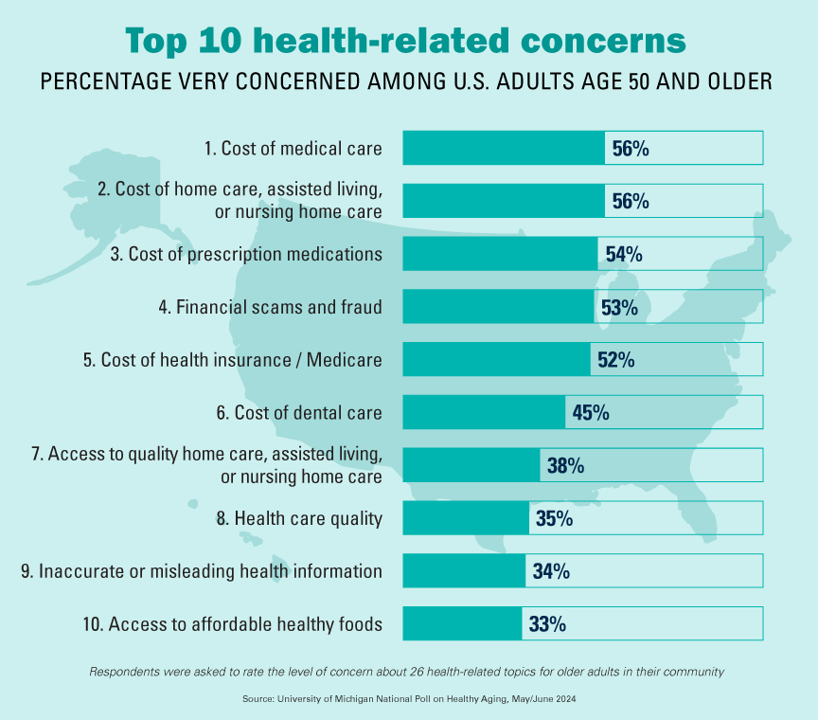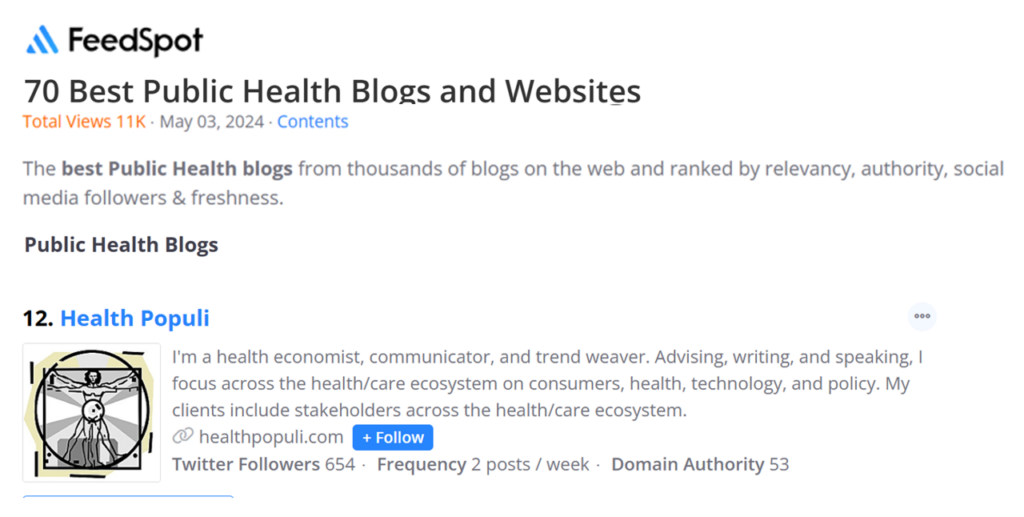Among Americans 50 years of age and over, the top health-related concerns are Cost, Cost, and Cost — for medical services, for long-term and home care, and for prescription medications.
Quality of care ranks lower as a concern versus the financial aspects of health care in America among people 50 years of age and older, as we learn what’s On Their Minds: Older Adults’ Top Health-Related Concerns from the University of Michigan Institute for Healthcare Policy and Innovation. AARP sponsors this study, which is published nearly every month of the year on the Michigan Medicine portal. 
The first chart from the study arrays the top 10 concerns for the 50+ health citizen, with over 50% concerned about costs and financial scams/fraud — with just under one-half worried about the cost of dental care.
The University of Michigan’s National Poll on Healthy Aging engaged NORC at the University of Chicago to field the study in February and March 2024, conducted among 3,379 U.S. adults between 50 and 101 years of age. The study was conducted online and by phone. 
Here is a list of all the questions — by concern — the Poll assessed, from (a) access to affordable healthy foods to (z) Vaccine hesitancy. Thus, the survey looked across 26 factors of worry well beyond cost — including social determinants and drivers of health like obesity, alcohol use, poverty, and social isolation, along with health system factors such as unequal access to health care, inaccurate or misleading health information, and ageism and age discrimination. 
There were significant gender differences found in this study among older women versus older men: the widest percentage-point difference found cross-gender was s=for poverty, with 39% of women very concerned for older adults in their community compared with only 25% of men worried about poverty and health.
Interestingly, household income level did not significantly affect older peoples’ level of concern in their communities for any of the cost or access issues except for dental care costs.
For U-M’s video on the report, check this out:
Health Populi’s Hot Points: Yesterday, the U.S. Department of the Treasury released the Medicare and Social Security Trustees’ reports on the financial state of these two programs, designed to support older Americans in healthy and financially secure aging in the U.S. 
A key finding of the actuaries’ calculations in the report is the expected Medicare budget shortfall projected for 2036 as the health insurance insolvency date. At that point, payments would be cut an average of 11% and, in the words of the Trustees, “would likely lead to significant disruptions in health care services for older individuals and those with disabilities.”
This forecast is no doubt not lost on American seniors, as represented in advocacy by the AARP which came out with its own assessment of yesterday’s reports.
“While there was good news today in the trustees’ reports, older Americans need certainty that Medicare and Social Security will be protected,” Jo Ann Jenkins, CEO of AARP, observed. Still, “for long-term sustainability, Congress owes it to the American people to reach a bipartisan solution, ensuring people’s hard-earned Social Security benefits will be there in full for the decades ahead. The stakes are simply too high to do nothing,” Jenkins added.
AARP explained that to avoid any shortfall, Congress would have to deal with the entitlement program’s underlying fiscal health: whether that would involve reducing benefits, increasing taxes, re-allocating other government revenue, or some combination of these approaches. AARP’s own survey found that 9 in 10 people 50 years of age and older wanted Democrats and Republicans to work together to solve the Medicare and Social Security financial gaps.
This was echoed by Social Security Commissioner Martin O’Malley whose statement read, “Congress can and should take action to extend the financial health of the Trust Fund into the foreseeable future, just as it did in the past on a bipartisan basis, Whether Congress chooses to eliminate the shortfall by increasing revenue, reducing benefits or some combination is a matter of political preference, not affordability.




 Thanks to Feedspot for identifying
Thanks to Feedspot for identifying  Jane was named as a member of the AHIP 2024 Advisory Board, joining some valued colleagues to prepare for the challenges and opportunities facing health plans, systems, and other industry stakeholders.
Jane was named as a member of the AHIP 2024 Advisory Board, joining some valued colleagues to prepare for the challenges and opportunities facing health plans, systems, and other industry stakeholders.  Join Jane at AHIP's annual meeting in Las Vegas: I'll be speaking, moderating a panel, and providing thought leadership on health consumers and bolstering equity, empowerment, and self-care.
Join Jane at AHIP's annual meeting in Las Vegas: I'll be speaking, moderating a panel, and providing thought leadership on health consumers and bolstering equity, empowerment, and self-care.